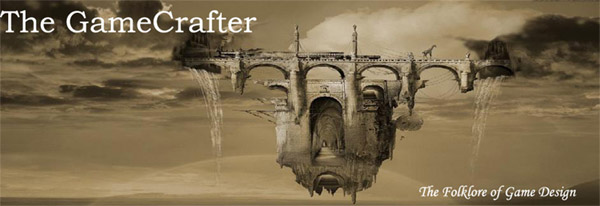Comment from a reader ------------------
I just came across your blog after reading a post you made on the M&B forums -- I like the ideas that you propose.
I've been toying with the idea of game design for awhile, and have plenty of "ideas" about what makes an ideal game. I won't share those now though.
My point for this comment is as follows: my wife hates it when I play games. She doesn't understand that since the age of 6, I've been playing games starting with an Atari 2600, C64, IBM PC, nintendo, up to the current generation of PC games. Like yourself, I (used to) plow through a large number of games, search for nuggets of ingenuity and true skill. Now I am "not allowed" to purchase more than 1 game per year, even that's a struggle
So my question for you is how does your wife react to your gaming? How can I get my wife to understand it's something important to me? Given her dislike of me playing games, I don't think there's any way she'd support me creating a game (which is a significant time and money investment!).
p.s., I'd also like to mention the game "Dwarf Fortress" to you -- (www.bay12games.com). At first glance it looks very roguelike, with ascii-like graphics, but the mechanics and gameplay are really what shines for me. The learning curve is a little bit steep, but it's worth the time (and it's free).
-----------------------------------------------------
Answer to Comment… life balance as a gamer.
I want to answer your question for a variety of reasons. This is a problem and pain that the majority of adult gamers face. I have faced it in my life and I have had both professional training and some therapy that touched upon this subject.
I want to put forward right now, that this is a very complicated issue and it involves nearly every aspect of our lives. I will try to share with you as best as I can, what I have learned.
Personally, my wife hates gaming. She does not understand it, thinks it is a waste of time. For many years we struggled with a balance between the passion and time that I give to my hobby and her desire for me not to be involved with it.
That last sentence we finally came to understand was the key. Let me explain.
We have three lives; all of us, all the time.
We have our professional life, our family life and our personal life. We are the happiest when they are all in balance. This means that we have the time, energy and resources to dedicate to being successful in each one.
For our professional life, this generally means that we are in a positive work environment and have a good self-esteem with what we are doing and the prospects of the future are prosperous.
In our family life this means that we have the time and money to pay our bills, save for the future, spend time with those we love and nourish the relationships with those whom are closest to us.
Our personal life is what we do for ourselves to nourish ourselves. By this I mean that it is the way in which we grow, understand, create, socialize and ultimately become better people.
Often time, when either our professional life or our personal life does not completely fulfill us, we turn to our personal life to find solace. If you were a drinker, then you hit the pubs more often. If you are reader, you pick up some books to read. If you were an artist, you may bury yourself in your creativity.
Gaming, in all its forms, is a mesh of real life and mathematics. Especially in MMO’s where we interact with other people we have the opportunity to “reinvent” ourselves as guild leaders, or can have various forms of “Power” that can garner respect from other people, that we do not receive in our professional life or even perhaps in our family life. If you look at Maslow’s hierarchy of needs, often we, as gamers, get those higher order needs from our gaming experiences that we are not getting from real life.
Lets bring this back down out of theory and get it into the practical level.
What my wife and I came to realize: Was that it was not gaming that was the real issue.
Football wives, baseball wives, bowling wives, hockey wives, etc, all have the same problems as gaming wives, and they are steeped in the same root causes.
Our partners need attention and need to feel that they matter, just like we do. Part of the problem is that with gaming, we are visible and are physically present to them, but we are involved with something other than them. Further, the results of this “time” cannot be mapped to something that is benefiting the family directly. You are not making money, building the fence, painting the house, or fixing the car. They see this as competition to their “Family Time”. This is easily interpreted as “I am here, and if I am here and you are here, then I am more important than that computer?” When we spend time on the computer, are not involved with something that is of benefit to the family, and our significant other is present, a conflict arises.
The root problem is about perception and needs.
Now I was lucky in that my wife has some hobbies that she does in the home that I have little or no interaction with. She gets pretty surly when I walk into one of her mystery movies or sit down with her when she is scrapping and start asking questions. Luckily she realized her behaviors and we were able to start a dialogue that mapped the same soft of behaviors in reverse to what she was complaining about with my “games”.
The key here, is balance. My personal success here, is that if my wife needs my attention, or my kids need my attention when I am on the computer, I drop the computer immediately to help them or pay attention to them. I also take lots of breaks where I seek out my partner and engage her (when she is not tied up in her hobbies). This helps reinforce that they are more important than my hobby... and they are, I just have to show it to them.
There are some other aspects here that you have brought up.
One was about spending money to purchase a game and being “Allowed” to purchase a game.
My wife and I pool our money into a central account except for a small “stipend” or allowance each of us receives from our paychecks. This goes into our respective personal accounts and we can do with that money anything we want “With no interference or judgment from the other”.
Each of us must have some level of financial independence from the other to explore and fund our respective “personal” lives. Without it, we become trapped and begin to resent the control that the other has on our lives, which is not healthy for any relationship. Resentment kills the positive regard we have to our spouses, and from what once was love and friendship will eventually turn into either obedience and dislike, or someone will walk away from the relationship all together.
The last point you bring up that I want to address is about creating your own game, or own game company. When you do this, you are married to that game, that concept that company. It is not your mistress, it is your wife. Any business, game related or not, takes a great deal of energy, passion and money to make work. It is a huge investment of time that takes away from other aspects of your life. I am not saying don’t, just that it is all consuming. I remember with Legends when I was in the process of programming it, I took an afternoon out and took my wife to a movie. I distinctly remember the moment when I realized that I was spending too much time working on the game. I was standing in line, chatting with my wife when there was a lull in the conversation. My mind immediately went to a segment of code I was trying to debug and improve and for several minutes I “zoned out” internally running, by memory, each and every line of code for that sub routine. This will happen to you.
The last thing I will impart to you, for better or ill. When you choose your hobby to become your livelihood, you lose something. When your work becomes your play, playing becomes work. When I became professional many years ago, I could not look at a game or title and enjoy it for what it was. It was always some form of competition that I dissected to the nth degree. I had lost what made games important to me… fun.
So mate, I hope that this soliloquy was of some value to you.
Thanks for the tip on Dwarf Fortress.. I will check it out.
Best regards,
Jim
Wednesday, January 7, 2009
Subscribe to:
Post Comments (Atom)





1 comment:
Jim,
I am a wee bit late to the party, but I wanted to say that this particular article strikes a chord with me. I was at Rolling Thunder Games back in the early 1990s (programmed Victory) and this blog entry exactly summed up my experiences.
15 years out of the industry and I can play a game again without analyzing it (too much).
It is great to see you doing well in life and contributing to both education and games again.
It looks like this blog isn't active any more, but that's fine. I just wanted to say thanks for putting this post out on the web.
Terry
Post a Comment